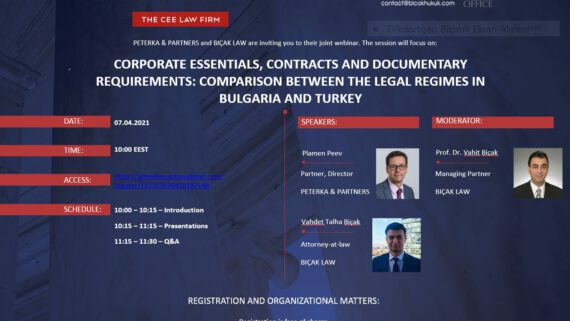Investigating the Istanbul Finance Centre (IFC) unveils a dynamic nexus of financial prowess. This article delves into its significance as a financial center, analyzing its intricate components, organizational structure, and the compelling incentives driving its growth. Also, it examines the robust regulatory framework that underpins its operations, ensuring stability and transparency. With their acute understanding of financial regulations, Bicak provides tailored legal services essential for businesses to thrive within this ecosystem. Bicak navigates the complexities of cross-border transactions, compliance intricacies, and dispute resolution, securing the foundations of financial activities. The IFC’s ascent reflects the convergence of legal acumen and financial ambition. As it emerges as a global contender, Bicak’s role in steering its legal dimensions is paramount, reinforcing the Centre’s promise of a thriving and compliant financial future.
Laws & Regulations of Istanbul Financial Centre
In 2022, Turkish Parliament has accepted a law which introduces the establishment of the Istanbul Finance Centre (IFC) in İstannbul, Turkey. Participants of the IFC will have certain tax advantages, including the ability to keep their legal books in foreign currency and the eligibility to freely choose a law of a different jurisdiction as the governing law for their private law contracts.
Understanding Financial Centers: Catalysts of Economic Dynamism
In the fast-paced realm of global finance, financial centers stand as the epicenters of economic activity, innovation, and connectivity. These bustling hubs play a pivotal role in fostering financial services, attracting investments, and facilitating international trade. But what truly constitutes a financial center, and what components are necessary for its establishment and success?
Defining a Financial Center
At its core, a financial center is a geographic location that concentrates a diverse range of financial institutions, markets, and services, all working in synergy to drive economic growth and prosperity. Financial centers provide a conducive environment for businesses, investors, and governments to collaborate, innovate, and access capital. These centers often act as nerve centers for information exchange, liquidity creation, and the efficient allocation of resources.
Components of a Thriving Financial Center
Several critical components must converge to transform a city or region into a thriving financial center:
- Financial Institutions: A robust array of banks, investment firms, insurance companies, and other financial entities form the foundation of a financial center. These institutions facilitate transactions, manage risk, and offer a spectrum of financial services to businesses and individuals.
- Capital Markets: A developed and transparent capital market is essential for raising funds through equity and debt issuance. Stock exchanges, bond markets, and other trading platforms enable companies to access capital from both domestic and international investors.
- Regulatory Framework: A well-defined regulatory environment fosters confidence and stability in the financial sector. Effective regulatory bodies oversee financial activities, ensure compliance, and protect investors and consumers.
- Skilled Workforce: A pool of skilled professionals, including financial experts, legal advisors, analysts, and technologists, is crucial for driving innovation, managing risks, and delivering sophisticated financial services.
- Infrastructure: Advanced technology infrastructure, including reliable communication networks, data centers, and digital platforms, underpins efficient and secure financial operations.
- Connectivity: A financial center’s global reach depends on seamless connectivity to international markets and financial systems. Strong transport links and digital connectivity facilitate the flow of people, capital, and information.
- Legal and Political Stability: A stable political environment and adherence to the rule of law provide a secure foundation for financial activities. Consistent legal frameworks protect contracts, property rights, and intellectual property.
- Attractive Business Environment: Favorable tax policies, ease of doing business, and government support encourage the establishment and growth of financial institutions.
- Innovation Ecosystem: A culture of innovation and research supports the development of new financial products, services, and technologies.
As Istanbul positions itself as a burgeoning financial center, these components must converge strategically to catalyze economic dynamism, draw investments, and facilitate global financial interactions. The subsequent sections of this article will delve into the specific rules and regulations that shape Istanbul’s evolving role as a prominent financial hub.
Incentives and Regulatory Framework
Nestled within a distinct designated area, the Istanbul Financial Centre (IFC) embodies a strategic convergence of commerce and finance. This designated area encompasses two distinct zones: the office area, where financial institutions orchestrate their operations, and an out-of-scope area featuring commercial and social establishments, catering to the daily needs of employees and visitors.
Central to the IFC’s operation is the concept of “participants.” These participants, encompassing individuals and legal entities, their branches, representatives, ordinary partnerships, liaison offices, regional management centers, and national wealth funds, seek to operate within the office area. These entities are granted participant certificates by the Presidential Finance Office, signifying their authorization to engage in activities within the IFC.
Exporting Financial Services: A Global Perspective
A significant facet of the IFC’s allure is its role as a conduit for the exportation of financial services. Financial institutions possessing participant certificates can provide financial services to nonresidents, and these transactions are classified as exportation of financial services, provided the ultimate beneficiaries of these services are situated abroad. This exportation encompasses a broad spectrum of services, facilitating cross-border transactions, investment, and financial activities that extend beyond national borders.
Tax Incentives: Paving the Path for Growth
One of the cornerstones of the IFC’s appeal lies in the array of tax incentives extended to its participants. These incentives are strategically designed to bolster financial activity, enhance competitiveness, and stimulate economic growth. Among the notable provisions are deductions, exemptions, and other tax advantages that encompass multiple dimensions of financial operations:
- Deductions: Corporations operating within the IFC can benefit from a 75% deduction from their corporate income, provided the earnings derive from the exportation of financial services. This rate escalates to 100% for the taxation periods spanning 2022 to 2031.
- Banking and Insurance Transactions Tax (BITT) Exemption: Transactions associated with the exportation of financial services within the IFC, along with the proceeds from these transactions, are granted exemption from BITT.
- Fee and Stamp Tax Exemptions: Fees and stamp taxes linked to transactions related to the exportation of financial services within the IFC are waived.
- Income Tax Exemption: Participants in the IFC enjoy income tax exemptions for the wages paid to their personnel. This exemption tier is linked to the employee’s professional experience abroad, ensuring competitive remuneration for those with substantial international exposure.
- Leasing and Property Transactions: The IFC extends exemptions for fee and stamp taxes related to transactions and documents regarding the leasing of immovable properties.
Currency Flexibility and Choice of Governing Law
The IFC introduces flexibility by allowing financial institutions to maintain their books and documents in foreign currency. This measure enhances efficiency and aligns with global financial practices, irrespective of national tax and commercial regulations. Furthermore, participants enjoy the privilege of choosing a governing law for transactions and contracts conducted under private law within the IFC’s scope, provided it adheres to applicable legislation.
Enriching Workforce Diversity
Recognizing the global nature of modern finance, the IFC welcomes a diverse workforce. Participants operating within the IFC, along with those engaged in active operations across at least three countries, are empowered to employ foreign personnel equipped with valid work permits. This dynamic encourages the infusion of international expertise and perspectives, enriching the collaborative atmosphere within the IFC.
In the subsequent segments of this exploration, we delve deeper into the regulations, compliance frameworks, and operational intricacies that underpin Istanbul’s ascent as a burgeoning financial center.
Navigating the Regulatory Framework
A significant stride towards realizing the vision of Istanbul as a formidable financial hub has been marked by the implementation of the Istanbul Financial Centre Regulation. Entering into force on July 7, 2023, through its publication in the Official Gazette, this Regulation acts as a linchpin, enshrining the operational intricacies of the Istanbul Financial Centre (IFC) as outlined by the Istanbul Finance Centre Law.
Deciphering the Regulation: Operational Nuances
The Regulation’s purview encompasses multifaceted aspects, ranging from the management and operation of the IFC to the functioning of the anticipated “One Stop Bureau.” Among its pivotal provisions are guidelines governing the issuance of the participation certificate, a prerequisite for entities seeking to operate within the IFC.
The One Stop Bureau: Facilitating Efficiency
A central pillar of the Regulation, the One Stop Bureau, will serve as a catalyst for streamlining operational processes. Designed to expedite operation permits, applications, and employee approval procedures, the One Stop Bureau acts as a centralized hub for coordinating public institutions involved in IFC operations. Managed by the Finance Office, this entity aims to oversee IFC activities from a single focal point, enhancing coordination and responsiveness.
Services offered through the One Stop Bureau will be accessible via the IFC portal. While tasks such as appointment scheduling, application tracking, and information requests will be handled within the portal, core services will be executed through the information systems of relevant public institutions. Adequate and qualified personnel from these institutions will be allocated to the One Stop Bureau, ensuring efficient and seamless service delivery. Existing public institutions within the IFC will not establish physical service spaces within the Bureau.
Participants are granted autonomy in choosing to access services offered by the One Stop Bureau, with information and referral services provided free of charge.
Management Company: Steering the IFC’s Course
The Management Company, “TVF İFM Gayrimenkul İnşaat ve Yönetim Anonim Şirketi“, emerges as a pivotal player in the IFC’s functioning. Created as a private law entity by the Türkiye Wealth Fund, the Management Company assumes a 20-year mandate to oversee the operation, leasing, and management activities of the IFC. Tasked with generating income primarily through management fees, commissions, advertising, and sponsorships, the Management Company ensures the sustainability of the IFC’s operational aspects.
Structured Building Usage and Leases
A notable feature of the Regulation pertains to the designated usage of buildings within the IFC. These structures are bound by the stipulations outlined in the operation project and management plan of the IFC, ensuring alignment with its overarching objectives.
The exclusive authority to lease buildings within the IFC rests with the Management Company. This includes lease agreement preparation, negotiation, fee collection, collateral management, and subsequent transfer to building owners. Building owners retain the right to allocate offices to affiliates, shareholders with Participation Certificates, public institutions, and authorities. This facilitates an orchestrated approach to office allocation and lease management.
The Significance of the Participation Certificate
A pivotal element for any entity seeking operation within the IFC is the Participation Certificate. This certificate is not only mandatory for office operations within the IFC but also a gateway to accessing exemptions, incentives, and exceptions outlined in the Law. Evaluated by the Presidency of the Republic of Türkiye Finance Office, the issuance and evaluation of the Participation Certificate are facilitated through the online IFC portal.
Engaging in financial activities as defined by the Law necessitates obtaining the Participation Certificate. This includes a spectrum of financial services such as banking, insurance, leasing, factoring, payment services, and more. Applicants, both individuals and legal entities, must apply to the Finance Office for the Participation Certificate, which is distinct from operation permits, licenses, and approvals required from public institutions for specific activities.
A Rigorous Evaluation Framework
The Finance Office undertakes a meticulous evaluation of Participation Certificate applications, considering development plans, sectoral objectives, and the congruence of applicants with the IFC’s business strategy. Additionally, alignment with IFC’s ecosystem objectives and compatibility with existing participants’ activities contribute to the evaluation process. Notably, candidates who hold necessary authorizations, engage in specified value-added sectors, consultancy and support services, are accorded priority.
Ensuring Compliance and Adaptability
In line with the IFC’s commitment to transparency and accountability, the Regulation outlines conditions for the suspension and cancellation of the Participation Certificate. Suspension is invoked when participants’ operation permits or licenses are suspended by relevant regulatory authorities. The Finance Office reserves the right to cancel the Participation Certificate under circumstances such as office allocation termination, revocation of regulatory approvals, breach of commitments, or misrepresentation. Upon cancellation, participants are allowed to reapply after 180 days from the cancellation date.
These regulatory facets underscore the meticulous design and rigorous evaluation processes that govern Istanbul’s ascent as a financial center. The forthcoming segments delve further into the regulatory tapestry, compliance standards, and operational intricacies that underpin Istanbul’s financial prowess.
Facilitating Legal Excellence for Istanbul Finance Centre
In the bustling world of financial hubs, legal expertise forms the backbone of stability and progress. Istanbul Finance Centre (IFC), with its ambitious aspirations, is no exception to this rule. To navigate the complex legal landscape of the financial world, businesses within the IFC require legal partners who not only possess an in-depth understanding of financial regulations but also exhibit a profound commitment to upholding the highest standards of legal practice. This is where Bicak steps into the limelight.
A Trusted Legal Companion
Bicak has established itself as a pillar of legal support within the Istanbul Finance Centre. With a rich history of providing comprehensive legal services tailored to the financial sector, Bicak emerges as a trusted companion for businesses seeking expert guidance. Their legal professionals bring to the table a nuanced understanding of both Turkish and international laws, ensuring that clients can confidently navigate intricate cross-border transactions, regulatory compliance, and dispute resolution.
Expertise in Financial Regulations
Navigating the regulatory intricacies of the financial world demands a keen eye for detail and an in-depth knowledge of ever-evolving laws. Bicak’s team of seasoned lawyers specializes in financial regulations, enabling them to guide clients through the labyrinth of compliance requirements. Whether it’s structuring financial products, addressing anti-money laundering protocols, or understanding tax implications, Bicak stands ready to provide clear and actionable legal insights.
Tailored Solutions for Financial Institutions
Financial institutions operating within the Istanbul Finance Centre benefit from Bicak’s tailored legal solutions. From fintech startups to established banking giants, Bicak crafts strategies that align with each client’s unique objectives. Their proactive approach helps businesses anticipate legal challenges and navigate them effectively, ensuring a strong foundation for growth and innovation.
Safeguarding Transactions and Dispute Resolution
In the fast-paced world of finance, swift and effective dispute resolution is crucial. Bicak offers a well-rounded approach to dispute resolution, ranging from negotiation and mediation to litigation when necessary. Their legal experts understand the urgency of protecting transactions and investments, and they work tirelessly to safeguard their clients’ interests while seeking optimal outcomes.
A Legal Beacon for Istanbul Finance Centre
As Istanbul Finance Centre positions itself as a global player in the financial arena, the significance of solid legal counsel cannot be overstated. Bicak shines as a beacon of legal excellence within this vibrant ecosystem, offering businesses a reliable partner to navigate the legal complexities inherent in the financial sector. Their dedication to staying ahead of regulatory changes, their expertise in financial law, and their commitment to personalized solutions make them an indispensable asset for any business operating within the Istanbul Finance Centre.
In the grand tapestry of the financial world, Bicak emerges as a key thread, weaving together legal acumen and financial progress within the Istanbul Finance Centre.
Disclaimer: This article is intended for informational purposes only and should not be considered legal advice. Readers are encouraged to consult with legal professionals for specific legal guidance related to their circumstances.
 English
English Türkçe
Türkçe Français
Français Deutsch
Deutsch










Comments
No comments yet.